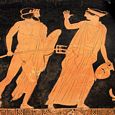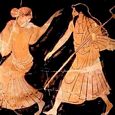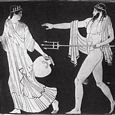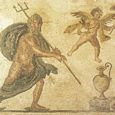AMYMONE
Greek Name
Αμυμωνη
Transliteration
Amymonê
Latin Spelling
Amymone
Translation
Blameless, Noble

AMYMONE was one of the Danaides--fifty daughters of King Danaus. The family emigrated from Libya to Argos in the Greek Peloponnese but arrived to find a land parched by drought. Danaus sent his daughters out in search of water and in the course of her wanderings Amymone came upon Lerna where she was seduced by the god Poseidon. As a reward he caused a spring of water to gush from the earth, relieving the Argive drought.
Some time later the fifty sons of Danaus' twin brother Aigyptos (Aegyptus) arrived in Argos seeking the hands of the Danaides in marriage. They forced the king to agree but the girls, conspiring with their father, murdered them all on the wedding night. Amymone herself slew Enkelados (Enceladus).
FAMILY OF AMYMONE
PARENTS
[1.1] DANAUS & EUROPE (Apollodorus 2.16)
[1.2] DANAUS (Pausanias 2.37.1, 4.35.2, Philostratus Imagines 1.8)
OFFSPRING
[1.1] NAUPLIOS (by Poseidon) (Apollodorus 2.23, Pausanias 2.38.2, 4.35.2)
ENCYCLOPEDIA
AMYMO′NE (Amumônê), one of the daughters of Danaus and Elephantis. When Danaus arrived in Argos, the country, according to the wish of Poseidon, who was indignant at Inachus, was suffering from a drought, and Danaus sent out Amymone to fetch water. Meeting a stag, she shot at it, but hit a sleeping satyr, who rose and pursued her. Poseidon appeared, and rescued the maiden from the satyr, but appropriated her to himself, and then showed her the wells at Lerna. (Apollod. ii. 1. § 4.) According to another form of the tradition, Amymone fell asleep on her expedition in search of water, and was surprised by a satyr. She invoked Poseidon, who appeared and cast his trident at the satyr, which however struck into a rock, so that the Satyr escaped. Poseidon, after ravishing the maiden, bade her draw the trident from the rock, from which a threefold spring gushed forth immediately, which was called after her the well of Amymone. Her son by Poseidon was called Nauplius. (Hygin.Pab. 169; Lucian, Dial. Marin. 6; Paus. ii. 37. § 1.) The story of Amymone was the subject of one of the satyric dramas of Aeschylus.
Source: Dictionary of Greek and Roman Biography and Mythology.
CLASSICAL LITERATURE QUOTES

Aeschylus, Amymone (lost play) (Greek tragedy C5th B.C.) :
Aeschylus' lost satyr-play Amymone told the story of the maiden's seduction by the god Poseidon.
Apollodorus' account (below) probably summarizes the plot.
Aeschylus, Fragment 4 Amymone (from Ammonius, On Words 37) (trans. Smyth) (Greek
tragedy C5th B.C.) :
"[Poseidon addresses Amymone :] ‘It is thy fate to be my wife; mine to be thy husband.’"
Pseudo-Apollodorus, Bibliotheca 2. 14 (trans. Aldrich) (Greek mythographer C2nd A.D.)
:
"Poseidon had dried up even the springs [of Argos]. So Danaus sent his daughters out to find water. One of
them, Amymone, while searching threw a spear at a deer and hit a sleeping Satyros (Satyr), who woke, jumped up,
and was ready to have sex with her. Then Poseidon appeared and the Satyros ran off; so Poseidon himself made
love to her, after which he told her about the springs of Lerna."
Pseudo-Apollodorus, Bibliotheca 2. 16 :
"The four daughters of Danaus and Europe, named Automate, Amymone, Agaue (Agave), and Skaia (Scaea), were
allotted [in marriage] to [Aigyptos (Aegyptus) and] Argyphia's other sons, Bousiris (Busiris), Enkelados
(Enceladus), Lykos (Lycus), and Daiphron. [The Danaides each slew their husband on the wedding night.]"
Pseudo-Apollodorus, Bibliotheca 2. 23 :
"Amymone bore to Poseidon a son Nauplios (Napulius)." [N.B. Nauplios was the king of Nauplia in
Argolis at the time of the Trojan War.]
Pseudo-Apollodorus, Bibliotheca 2. 78 :
"Herakles found the Hydra on a ridge beside the springs of Amymone [i.e. of Lerna] where she nested."
Callimachus, Aetia Fragment 66 (trans. Trypanis) (Greek poet C3rd B.C.) :
"O water Nympha Nepodes (Water Nymph) bride of Poseidon [Amymone] . . . the sacred rock about which you
flow . . . Venerable Amymone, and beloved Physadea and Hippe and Automate [i.e. the other springs of Argos],
hail, most ancient home of Nymphai (Nymphs); flow, brilliant Pelasgian maidens."
Pausanias, Description of Greece 2. 37. 1 - 2 (trans. Jones) (Greek travelogue C2nd
A.D.) :
"At this mountain [Pontinos in Lerna] begins the grove, which consists chiefly of plane trees, and reaches
down to the sea. Its boundaries are, on the one side the river Pantinos, on the other side another river, called
Amymone, after the daughter of Danaus . . . By the sea is a stone image of Aphrodite. They say that the
daughters of Danaus dedicated it."
Pausanias, Description of Greece 2. 24. 2 :
"[In the town of Argos :] As you go to the citadel there is on the left of the road another tomb of the
children of Aigyptos (Aegyptus). For here are the heads apart from the bodies, which are at Lerna. For it was at
Lerna that the youths were murdered, and when they were dead their wives [the Danaides] cut off their heads, to
prove to their father that they had done the dreadful deed."
Pausanias, Description of Greece 2. 38. 2 :
"Nauplia, which at the present day is uninhabited; its founder was Nauplios (Nauplius), reputed to be a son
of Poseidon and Amymone."
Pausanias, Description of Greece 4. 35. 2 :
"The Nauplians in my view were Egyptians originally, who came by sea with Danaus to the Argolid, and two
generations later were settled in Nauplia by Nauplios (Nauplius) the son of Amymone."

Philostratus the Elder, Imagines 1. 8 (trans. Fairbanks) (Greek rhetorician C3rd
A.D.) :
"[Ostensibly a description of an ancient Greek painting at Neapolis (Naples) :] Poseidon's journey over the
sea I think you have come upon in Homer, when he sets forth from Aigai (Aegae) to join the Akhaians (Achaeans),
and the sea is calm, escorting him with its sea horses and its Ketea (Sea-Monsters); for in Homer they follow
Poseidon and fawn upon him as they do here in the painting. There, I imagine, your thought is of dry-land horses
. . . but here it is Hippokampoi (Hippocamps) that draw the chariot, creatures with web-footed hoofs, good
swimmers, blue-eyed, and, by Zeus, in all respects like dolphins . . .
He [Poseidon]
is painted as radiant, of joyous look, and deeply stirred by love. For the sight of Amymone, the daughter of
Danaus, as she visits the waters of Inakhos (Inachus), has overmastered the god and he sets out to pursue the
girl, who does not yet know that she is loved. At any rate the fright of the maiden, her trembling, and the
golden pitcher falling from her hands make it evident that Amymone is astounded and at a loss to know with what
purpose Poseidon so precipitately leaves the sea; and her natural pallor, is illumined by the gold of the
pitcher, as its brightness is reflected in the water. Let us withdraw, my boy, and leave the maiden; for already
a wave is arching over the nuptials, and, though the water is still bright and pellucid in appearance, Poseidon
will presently paint it a purple hue."
Ovid, Heroides 19. 129 ff (trans. Showerman) (Roman poetry C1st B.C. to C1st A.D.)
:
"Neptune [Poseidon], wert thou mindful of thine own heart's flames, thou oughtst let no love be hindered by
the winds--if neither Amymone, nor Tyro much bepraised for beauty, are stories idly charged to thee, nor shining
Alcyone, and Calyce, child of Hecataeon, nor Medusa . . . nor golden-haired Laodice and Celaeno taken to the
skies, nor those whose names I mind me of having read. These, surely, Neptune, and many more, the poets say in
their songs have mingled their soft embraces with thine own."
Propertius, Elegies 2. 26c (trans. Goold) (Roman elegy C1st B.C.) :
"Neptunus [Poseidon], who is equal to his brother Jove [Zeus] in love. Proof is Amymone, who yielded to him
in the fields on condition she might have water, and Lerna' marsh struck by the trident; the god, embracing her,
fulfilled his promise, and her golden urn poured forth a stream divine."
ANCIENT GREEK & ROMAN ART
SOURCES
GREEK
- Aeschylus, Fragments - Greek Tragedy C5th B.C.
- Apollodorus, The Library - Greek Mythography C2nd A.D.
- Callimachus, Fragments - Greek Poetry C3rd B.C.
- Pausanias, Description of Greece - Greek Travelogue C2nd A.D.
- Philostratus the Elder, Imagines - Greek Rhetoric C3rd A.D.
ROMAN
- Ovid, Heroides - Latin Poetry C1st B.C. - C1st A.D.
- Propertius, Elegies - Latin Elegy C1st B.C.
- Valerius Flaccus, The Argonautica - Latin Epic C1st A.D.
BIBLIOGRAPHY
A complete bibliography of the translations quoted on this page.



